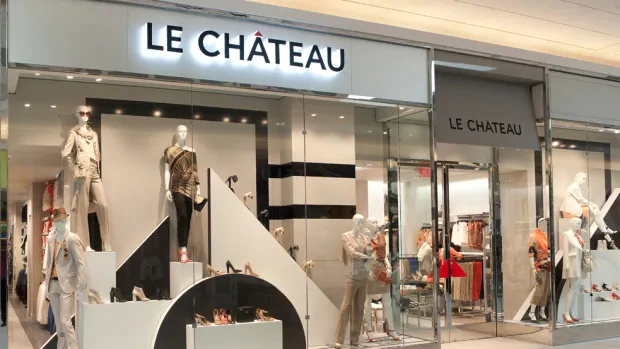Retailer Le Château is seeking court protection from its creditors while it winds down its operations and liquidates its assets.
The Montreal-based fashion chain with 123 locations across Canada and 1,400 employees said in a release Friday that it has applied for protection from its creditors under the Companies’ Creditors Arrangement Act, or CCAA.
In a release, management said it had “come to the very difficult decision that the company can no longer continue its operations as a going concern after having used its best efforts over the preceding months, with the assistance of professional advisers, to refinance or sell the company to a third party that would continue operating the business.”
The chain said the ongoing COVID-19 pandemic has had an “evident impact on consumer demand for Le Château’s holiday party and occasion wear, which represents the core of our offering [and] has diminished Le Château’s ability to pursue its activities. Regrettably, these circumstances leave the company with no option other than to commence the liquidation process.”
The retailer was scheduled to have its annual general meeting in Montreal on Thursday but abruptly cancelled the event two days prior without explanation beyond saying that the company “will provide further updates in due course.”
In the three-month period up until July 25, Le Château racked up just $14.7 million in sales across its network of stores and online. That’s down from almost $50 million in the same period last year. As of July, the company says it had about $118 million in assets, against $201 million worth of liabilities.
At the time, the chain thanked its landlords for granting it $4.6 million worth of rent relief for July and August. Despite that, it still warned there was some doubt about the chain’s “ability to continue as a going concern for the next 12 months.”
The chain is just the latest Canadian retail brand to file for CCAA amid COVID-19, including clothier Reitmans, drink seller DavidsTea, outdoor gear sellers MEC and Sail, fashion chain Mendocino, the company that owns Ricki’s Cleo and Bootlegger, and shoe retailer Aldo.

The CCAA proceedings will mean Le Château will soon begin the process of selling off all its remaining merchandise and shutting stores. It brings an end to the chain’s 60-year history and an end to a Canadian brand that was at various points at the top of Canada’s fashion world, fashion journalist Jeanne Beker said.
Founded in 1960 in Montreal, the chain was a major driver of what Beker calls the “youthquake” in fashion at the time, when all of a sudden children didn’t want to wear the clothes their parents got for them, and instead establish a style of their own.
“Le Château was at the vanguard of all that,” Beker said in an interview Friday. “Le Château was the hip place where you went to get the hip cool styles — a lot of styles that had not been that readily available in Canada before … at a price that was affordable, too.”
While COVID-19 seems to have been “the final nail in their coffin,” as Beker puts it, the chain had problems before, as it struggled to keep up with not only the capricious nature of fashion but also a growing movement toward sustainability in supply chains.
“Fashion has changed in a big way. The way that we consume fashion has changed, the way we buy it, the way we wear it — all those things have changed,” Beker said. “It was only a matter of time.”
LISTEN — Jeanne Beker explains what Le Château has meant to Canada’s fashion landscape
8:56Jeanne Beker on Le Château
Fashion journalist Jeanne Beker says the chain that’s seeking court protection from its creditors was on the vanguard of Canadian fashion for many years before falling on tough times. 8:56
Young people who once would have been the chain’s target demographic “are marching to the beat of a whole new drummer now,” she said.
“They don’t want the cheap and cheerful [thing to] wear for a season or two.”
“Value Village … that’s the hip thing to do, not to buy a prom dress at Le Château.”

Devoted web advocate. Bacon scholar. Internet lover. Passionate twitteraholic. Unable to type with boxing gloves on. Lifelong beer fanatic.





